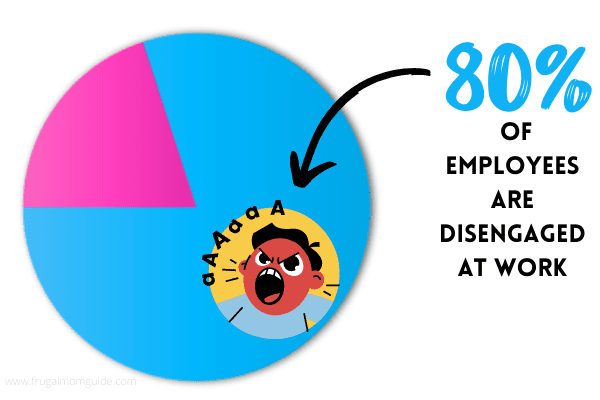Table of Contents
I Don’t Want to Go to Work – Why You Feel This Way and What You Should Do Next!
A bad day at home is still better than a good day at work! We’ve all heard that before and it pretty much sums up the “I don’t want to work anymore” feeling.
I don’t want to go to work! I’m tired of this place! I don’t want a job anymore!
Sound familiar? We’ve all been there! Actually, it doesn’t even matter if you love your job or not, we all feel like this from time to time.

This post may contain affiliate links. This means that we may make a commission (at no extra cost to you!) if you make a purchase via a qualifying link. You can read our full disclosure for more info!
There’s nothing to worry about! Your feelings are completely normal. Let’s be real, I don’t want to work anymore either!
Unfortunately, the professional couch potato industry hasn’t quite caught on yet and the bills have got to be paid.
Did you know that 80% of employees globally are disengaged at work? This means that eight in ten people, worldwide, are not enthusiastic about their jobs, employers and work situation.
Those thoughts of not wanting to work anymore are quite common. Let’s assess why and give some simple advice that can help you on your way to enjoying life and work.
I don’t want to go to work VS I don’t want to work anymore
What does it mean and is it normal?
There’s a big difference between just not wanting to go to work and not wanting to work ever again. More often than not, one is a prelude to the next, if left unchecked.
We all go through our ups and downs with everything we do: our financial lives, spiritual lives, relationships and work of course. It is simply a reflex action to feel despondent with regards to work in tough times.
Maybe an audit is coming up, a project deadline, an unexpected influx of work or a big presentation due. Everybody feels the pinch on work ever so often.
It’s enough to get you bummed out to the point where you wish you could just skip forward or ditch a day or two. Times like those are the “I don’t want to go to work” periods.
As ambitious professionals in our respective fields, we just suck it up and get through it. It’s very unlikely that you would quit every time you experience the slight bit of discomfort at work.
Before you know it, the rough patch is over and it’s smooth sailing again.
Those routine challenges usually make you stronger. Nothing a good night sleep, a long walk or a healthy meal wouldn’t be able to conquer.
If you throw in some nice music on your drive to work along with a motivational quote or two, you’ve got it covered. You know…minor fixes. At least, that’s how it should work!
What happens when your workplace becomes nothing but a never ending onslaught of challenges and obstacles? One test after the next.
You feel as though you are trapped in a pressure cooker all day and your nights are just a continuation of the nightmare. It can never seem to stop.
There’s only so much your mind and body can take. That’s when the “I don’t want to work anymore” sets in.
At this point you start questioning life, your purpose, the future. You feel trapped. Now is the time to step back and make major changes.

“I don’t want to work anymore” is when you’re one step away from quitting your job. You may or may not know what your next step would be.
A discussion with your manager might do the trick. But what if you already tried it and it didn’t work. Some jobs are just sucky by nature and managers all have their own agendas. It may not always align with yours.
What next? A change of employer? A career shift? Or just…I don’t want to work! I’m done with that!
You start contemplating the viability of foraging and living off the land. Hey…work can drive you crazy sometimes! Don’t judge! I’ve been there!
Whether you simply have a case of the Monday blues or wouldn’t give a hoot if your building burned to the ground, there are tips, tricks and strategies to get you over that obstacle.
Just know that this feeling and what you are experiencing is totally normal. As much as we all like to talk about work-life separation, unfortunately they are entwined to some level.
Your emotional life, financial life and work life are intermingled. Be honest with yourself, it’s hard to be very successful with one of those categories without it affecting the other.
If you got a big promotion at work, wouldn’t it make you happy? If you got a raise in salary, wouldn’t your financial life be affected positively?
Likewise, frustration at work will definitely negatively affect the other aspects of your life. What we don’t want is a decision that is based solely on emotion to ruin your life.
Again, I don’t want to work anymore is a totally legitimate feeling. With some solid financial and emotional guidance, you would get through it and make the best decision for you and your family.
Why I don’t want to work anymore?
1. Vision Loss
Have you ever lost sight of what you were doing professionally and why you were working? What did the sixteen-year-old version of yourself want from life?
You are taught to go to school, get a job and to live a happy and successful life. Naturally, as a child, I thought those three things flowed in that order. One was predicated on the other.
It should be! At some point in time, many of us accepted the fact that life is work and work is life. Success in life is based on success at work and you are defined as a person by your career. This is fine for whoever wants it to be this way.
It should not be forced down the throat of those that simply wanted to get a good job to be able to afford a good life for their families.
My goal was always “work to live, not live to work.”

When I left my corporate job I had years of unclaimed vacation days. Not that I didn’t want to take the days but my vacation time was always declined.
It was never the right time. The company was always in the middle of an important project or anticipating one that I needed to take care of.
Why was I working for them? I worked ninety plus hours a week, for years. I was constantly traveling and away from my family. No vacation time.
Was a successful career with a multi-national organization my ultimate goal in life? At the expense of everything else?
I always dreamed of a successful career as a stepping stone for a stable family life. Work as a source of funds for an enjoyable life, centered around family and friends.
That was my vision in life and what I ultimately wanted from a job.
Whenever your job robs you of your purpose and goals in life, it’s only natural for the I don’t want to work anymore feelings to set in.
This vision loss does not happen immediately but is a slow process. Eventually you’d realize that you lost who you were, somewhere along the way.
2. Demotivation
Demotivation is one of the major reasons for the I don’t want to go to work anymore attitude. It simply means that you’ve lost interest in your job.
A specific reason or a combination of factors over time could have just compounded to the point where you cannot help but feel like you don’t want to go to work.
Your feeling of demotivation with regards to your job can stem from a few common causes:
• Unfair Pay
Very few people are fully satisfied with their salaries. I mean, there is always room for improvement right?
Unfortunately, the always room for improvement cliché is usually held reserved for managers when they assess the performance of their top employees. It’s never reciprocated.
Feeling unhappy about your financial compensation, for the work you put out, is enough to make you unsettled.
• The dangling carrot
Were you ever offered a reward or promised a promotion if you accomplished a particular task in a certain time frame? Many bosses love to dangle dreams of salary raises and promotions in front of their employees to get them to continuously stretch themselves beyond their comfort zones.
Before you know it, years may have passed and you’re still working for the same pay, in the same role with quadruple the work load that you started with. At this point, you feel betrayed and pissed off.
This carrot dangling approach by many managers is a strong stimulant for the onset of the I don’t want to work anymore reaction.

• Company rules
Company rules are put in place to safe guard the wellbeing of the company. Yes, there are a host of great rules and regulations that do a good job with regards to maintaining order, cleanliness and safety.
However, there are always a bunch of rules that are a gray area, which are hinged on the discretion of your direct supervisor or manager.
The organization that I worked for previously had a rule where employees were to receive a compensatory day off for weekend days and public holidays worked. For office based workers that spent time out of country on assignments, they were to receive compensatory time off as well.
Beautiful set of rules! Such a caring organization that actually took the needs and personal lives of their employees into consideration!
However, the fine print at the bottom went to state that employees must liaise with their managers to obtain a suitable time to claim their compensatory days. Ouch!
For years I worked almost every weekend, for at least one day at the office, excluding time working at home. I spent between one hundred and three hundred days away on foreign work assignments in any one given year.
I spent years without vacation or compensatory time! It was never a good time based on the needs of the company, according to my boss.
This is just one example of how company rules can be manipulated to make working life a nightmare for employees.
I understood that it was tough for my boss to grant time off for me when the company had a lot going on. However, it felt like a punch in the stomach every time he went on vacation and I was never offered.
I don’t want to work anymore…for these people! That’s how I felt. It probably sounds like a clip from the Horrible Bosses movie but this is the reality of many workplaces. Many managers manipulate company rules in their favor.
Additionally, there are several genuinely tough rules that can make work life tedious.
Some workplaces have timed or scheduled bathroom breaks, strict communication rules or other tough conditions that are just part of the job. These are all contributing factors to you not wanting to go to work.
3. Poor Management
Since we were touching on bad management practices, let’s evaluate poor management and how it is a huge contributor to persons catching the I don’t want to work anymore bug.
In most exit interviews, persons cite management as a major contributor to them leaving the organization. As a matter of fact, it’s extremely common to see posts of “People don’t quit bad jobs, they quit bad bosses” all over social media.
This just goes to show that there is a direct correlation between poor management and persons not wanting to go to work anymore.
We touched on some bad traits that managers possess that contribute to demotivation. Apart from those we can look at a few more:
• Inconsistency with management
It seems as though managers always have their favorites. The guys that seem to do way less work but get the promotions and vacation time.
Being unfairly treated will definitely break your spirit and over time make you feel like you don’t want your job. Especially if you are giving it your all and others are just sliding through. You’re only human!
On the flip side, some managers treat all employees the same. This shows a lack of connection with their workers. If you treat your entire team as if they were just a bunch of worker robots, with no personal touch, this can also contribute to the degradation of employee morale.
It is important to strike a balance between treating employees fairly and kindly while positively reinforcing good work.

• Micromanagement
It is important for bosses to spend enough time with their direct subordinates to know those who thrive better under different management strategies.
Some persons actually like being micromanaged, others hate when bosses hover over them or figuratively spend all day poking them with a stick.
Micromanagement or an unsuitable management strategy will surely contribute to the I don’t want to work anymore syndrome.
4. Career Plateau
Been there, done that! You’ve accomplished your goals! You’ve climbed the corporate ladder, fulfilled the childhood dream. What now?
You’ve probably started experiencing lateral movements in your career now. The ascent can only go so far until you hit the plateau. For years, each promotion was indeed a promotion. You earned a more glamorous title in addition to a salary increase.
What happens when your next title is not higher in terms of organizational hierarchy as the last? You simply move from manager of one thing to the next? How does that make you feel?
As long as the money keeps increasing the title doesn’t matter right? Even though it may be fine for some, it’s not for others.
For many, the thrill of the climb is what keeps the motivation as far as working hard goes. People love power and the idea that it will eventually increase again.
Hitting a wall in terms of career progression and earning more prestigious titles can cause someone to lose their enthusiasm and actually enter into an I don’t want to work anymore phase.
5. Burn out
You hit the ground running, approaching your career challenges with a sprinter’s mindset. This strategy was enough to get you recognized initially as a special talent and a great worker. You felt invincible!
After some time has passed, reality has set in…you’re in a marathon and just gasping for breath! You’re burnt out and fed up! Your body is sore and your mind is just screaming I don’t want to work anymore!
This is the reality that many of us find ourselves in. You also probably spent a lot of time trying to prove yourself, eventually getting tired of the struggle.
Or you conquered all obstacles thrown at your way, championing your way to become the workplace phenom. However it started, somewhere along the journey you got tired and now you want out.

6. You dislike your co-workers
Not sure if you hate your job or just your coworkers? It’s quite possible that you don’t want to go to work simply because you dislike your coworkers. This is a very common workplace issue.
As much as we’d all like our goals to align and just trod along for the common good, that’s not realistic. Whilst the overall benefit of the workplace is priority, individual persons have their individual goals and priorities.
Therefore, there will always be a clash with persons who share different views. These simple difference of views, coupled with explosive personality types and varied cultural backgrounds, can get things quite tense at the workplace.
Additionally, multiple persons vying for limited numbers of workplace opportunities and promotions are bound to ruffle some feathers.
7. You feel undervalued
A combination of factors can contribute to you feeling undervalued and experiencing the I don’t want to work anymore crisis.
Your pay is below what you expect, based on the work that you put in. You are constantly overlooked for promotions or special assignments. You feel as though nobody respects you as a person and an experienced employee.
It’s a tough situation that many people find themselves in. You feel unappreciated and undervalued.
Furthermore, friction between yourself and your manager or co-workers can thicken to the point where you feel alienated at work. Tensions are always high and the workplace has become just a frustrating and toxic environment.
8. You hate your specific role
Somehow you always get the dirty jobs right? Simply disliking your job, role or specific tasks that are required of you on a daily basis can get very frustrating.
Everyone at a particular job site needs to work together to get all the tasks done to ensure smooth sailing of the organization. Simple enough.
Sometimes, even amongst persons with similar job titles, tasks can be unfairly divided and you always end up having to do the heaving lifting or annoying tasks.

9. Your job did not live up to expectations
How many of us thought that we’d go to school, get our dream job, immediately get paid a ton of money, buy our dream car and live in a mansion? Oh boy, if I could meet teenaged me day dreaming at school! I’ll slap him into reality!
Most of the stuff you learn at school just goes out the window when you get to the world of work. Even the stuff you learn at college, specific to a particular job, is hardly touched when you actually start to practice.
Not to mention, no one talks about all the messed up stuff you need to deal with in your professional life! They just omit that part. On top of it, junior level salaries suck!
How many doctors were aware of all the weird smells and sights they’d need to encounter until they were already 20 years into studying just for that? Too late to get out now!
I never knew that an engineer’s job would require me to be in subzero temperatures, on a windy facility, three hours from the nearest town, covered in ice, at midnight on new years’ eve. Regularly!
Well apart from the new year’s eve part, the rest was pretty common. I did not expect that. I just saw the money, blazer and nice pants and thought that I’d start off like that. Sign me up!
The reality of the job can come as quite a shocker, regardless of whatever profession you choose. Initially the hope of it eventually getting to what you originally pictured can be enough to spur you on. Sometimes it does get better.
However, very often, the disappointment of your job not living up to expectations can drive you into a state of I don’t want to go to work, or even the dreaded I don’t want to work anymore.
What should I do if I don’t want to work anymore?
Depending on how bad a case of the I don’t want to work anymore virus that you’ve come down with, there is a series of actions that you can take.
We’d address it from a mild case to increasing intensity. You can stop at any point in time once you are relieved of your I don’t want a job itch. Your ultimate goal is to be happy and to live with a work-life balance that you are comfortable with.
1. Take a break
Nothing is wrong with you for wanting to take a break. We all get tired or frustrated from time to time and the flame goes dim. Take a break and recharge!
Depending on your individual situation, your break would need to be structured accordingly. A mid-morning or afternoon coffee break is a legitimate form of relaxation that can end the monotony or intensity of your day, as the case might be.
Sometimes all you need is a step away from your workplace, a couple deep breaths and a cup of joe to get you going again. Meet up with a friend if you need to, or take a quick walk and have a chat.
In cases of lingering frustration, a day off here and there or a weekend getaway may be required. Make use of your employee benefits in terms of time off and do what you need to do to feel human again.
Take a full blown vacation if that’s what you need! You deserve a break!

2. Think about the root cause
It’s very important that you get to the root cause of the I don’t want to work anymore slump that you’re facing. Only by discovering the root cause would you be able to make adjustments to improve your attitude and emotional situation.
The root cause of any situation is the underlying source. Your entire position and stance with regards to not wanting to go to work is based on this one factor.
Let’s adopt something called the 5 Why investigative technique to get to the root cause. This strategy is a proven tactic used to determine the causal factor of incidents.
Basically, you ask yourself “Why?” until you determine the actual basis for you not wanting to work anymore. Typically, five times is a good rule of thumb before a solid conclusion is arrived but you can go on if needed.
For example:
I don’t want to work anymore!
#1 Why? – I get angry while I’m at work.
#2 Why? – The atmosphere is toxic.
#3 Why? – The employees are divided in cliques and the boss has his favorites.
#4 Why? – Clique A goes out golfing with the boss every weekend.
#5 Why? – Clique A actually has their liking for golf in common with the boss.
Now that you understand that the office is divided simply because a certain group shares a hobby with the boss, maybe you can make adjustments to your attitude against that particular group. Maybe you can join them sometime.
You’ve gotten to the root cause of the work place situation and you have broken it down into something you can deal with.
Looking at the office environment as a toxic, divided atmosphere is frustrating. But dissecting the situation to simply looking at a group of individuals that share a common hobby is not that bad when you think about it.
Try determining the root cause of your I don’t want to work anymore mood and it maybe pettier than you think or an easier fix than you expected.
3. Make time for your mental health
When you’ve hit the I don’t want to go to work wall, you are faced with an emotional crisis. This is a genuine emotional predicament and your mental health is at the center.
You need to stop and make time for your mental health. Reach out to a friend or family member and talk about how you feel. Many workplaces even have counselors or professionals that may be able to give you advice on whatever emotions that you are experiencing.
Think twice before discussing any situations with co-workers or human resource personnel though. You do not want your situation to be misinterpreted, gossiped or viewed as a report as in the case of HR.
If you think you need to, feel free to visit with a mental health professional to determine the causes of your emotional dilemma. Be sure to partake in activities that you enjoy on your non-work time to boost your morale and positively affect your mental health.

4. Supplement your income
Ever thought about counteracting your I don’t want to work anymore approach by working even more? Sounds crazy right? Trust me, it works wonders!
Actually, working more may be misinterpreted. It’s more like a reevaluation of your working priorities.
Many times, your depressed attitude with regards to work can be spun around by boosting your income with a side hustle.
By supplementing your income, you can relieve some pressure from yourself with regards to performance at your main job. I’m not saying to settle into mediocrity!
However, a missed promotion or an inadequate salary may not sting so much if your overall income was right. I always say: Not because your salary is small, your income has to be small!
Work on a side job to reduce your dependency on your main income! It will do wonders for your mental health!

SIGN UP FOR FREE GIFT CARDS & CASH
(I make $1000+ from these sites!)
Swagbucks gets you free gift cards, cash payout via PayPal (can cash out after earning as little as $3), plus you’ll immediately get a $10 sign up bonus!
Survey Junkie‘s benefits include gift cards, cash payout via PayPal (a low minimum payout of just $3), plus an immediate $10 sign up bonus.
With MyPoints, you’ll get gift cards, cash payout via PayPal (with just $5 needed to be able to cash out), plus a $10 sign up bonus!
Join InboxDollars for gift cards, cash via PayPal ($30 minimum payout) or personal checks, plus a $5 sign up bonus.
5. Start Investing
If you don’t want to work because you have ambitions to earn more money or to build a more financially successful life, this is excellent motivation.
Continue with your side hustles, start saving and build a portfolio of diversified investments. Eventually you can become a multimillionaire and you might not need your job anymore.
However, you need to strike the balance of finding motivation by not wanting to work whilst still maintaining a positive outlook about work. You may need your job to keep you afloat in the meantime and it’s not healthy to be miserable at work every day.
6. Reassess your daily routine
Sometimes all you need to do is evaluate your daily routine and include some fun activities and proper rest to neutralize the I don’t want to work anymore sting.
Your daily routine should be based on: priorities, efficiency, leisure and rest!
Evaluate what needs to be done each day and devise a plan to make them flow in an efficient manner. If you need to take a drive on a Sunday evening and fill your gas tank for the week in order to make your mid-week commute smoother, do it!
If you need to meal prep on a weekend or make breakfast the night before so you’re not frantic on a morning, do it! If you need to prepare your clothes for the week in advance, do it! Enjoy efficiency!
Once you boost your efficiency and include some break time in between, some wind down time at the end of the day, along with a proper sleep, you’d be running like a well-oiled machine!
7. Reassess your overall lifestyle
What do you want from your daily life? What would you like to accomplish at the end of each week? Personally, I don’t feel satisfied on any one given day if I don’t spend sufficient time with: work, family and exercise. That’s my trifecta!
My daily undertakings are planned in order to efficiently execute my work activities, family activities and exercise. It makes me feel complete when I go to bed at night. You need to decide what it takes to make you feel complete at any one given day.
Your strategy should positively affect you financially, mentally, physically and emotionally. When you evaluate your week, you may throw in a few additional projects or leisure activities like a concert or a trip to the beach. That should just be icing on the cake.
Your work life needs to compliment your personal life. At the end of the day, you need to be happy. Is your job affording you the life that you want? Financially and otherwise? They need to be in sync.
8. Think about your short term goals
In the world of work, there will always be moments or periods of intensity. Not every day or week will be the same. Additionally, to get your career started, you may need to flex a little bit and work a bit harder to get where you want to be.
However, it is very easy to accept a crappy work-life balance as your indefinite reality. Eventually, if left unchecked, you will become burnt out, dissatisfied and boarded on the I don’t want to work anymore train.
Be mindful of your trainee phase or your period of apprenticeship. Enjoy it! Embrace it and make the most of it. However, you need to set short term goals. By a certain number of years, you must be in a certain position or role.
Your short term goals or a five-year plan should be constructed to make your life enjoyable for you. Work hard but work with a plan to get what you want from life.

9. Think about your long term goals
Your long term goals need to be built from well executed short term goals. Where do you see yourself in ten or twenty years? What type of car, house, hobbies and family relationships would you like to have then?
Your job needs to be able to make this possible! If your current one doesn’t, you need to start thinking of alternatives. After all, it is quite possible that you feel frustrated at work and don’t want to work anymore simply because your current job doesn’t align with your long term goals.
When I close my eyes, I see myself throwing a ball at my kids every evening after school. I see myself helping them with home-work every day until they don’t need me anymore, even through high school.
Even when they don’t need my help every day, I’ll still be there to help them if they don’t understand something. I’ll take them to practice every Saturday. We’d go for family outings on a Sunday.
We’d take vacations every summer and enjoy the best Christmas dinners. We’d put it all on repeat when they get married and the grand kids come on.
That’s what I want from life and my job is structured in order to make this life possible. Only when you find the balance would true happiness set in and you’d free yourself from the I don’t want to work anymore shackles.
10. Consider a career change
If you’ve assessed all the advice for striking a balance between your work and mental wellbeing and you’ve realized that your current job is unable to get you there, you may need to consider a fresh start elsewhere.
You’re not alone. As a matter of fact, I did it. Make a move and get going with a career that works for you and your short term and long term goals.
You may not need to enter into a new field. You could have just had a sucky employer and need to work for someone else in the same industry. Or the nature of your current industry just doesn’t work with your life goals anymore. You need to make a big move.
Evaluate your situation and make an educated decision. Work hard and choose happy!
Is not wanting to work anymore normal?
It is completely normal to feel as though you don’t want to work anymore. However, you need to determine why you feel like this and take measures to address the situation.
Even if you not wanting to work at your current job stems from the fact that you have bigger goals and financial ambitions, you cannot live a mentally unhealthy routine until then.
You need to put things in place to address your feelings in the short term while arranging to grow your side income, savings and investments.
I don’t want to go to work VS I don’t want a career
A career is a profession structured around room for growth and progression in terms of salary, benefits and rank and occupies a significant portion of someone’s life. Many people like this idea but it may not be for everyone.
To many persons, a job is just an avenue to make money to pay the bills and to afford the general expenses and luxuries of life. Some people hate the idea of stagnation and commitment to a particular organization or industry.
Is it okay not to want a career?
Not wanting a career is totally fine. There are tons of ways to make money without trying to build a career. The most important thing is that you are happy with the lifestyle that you have.
Not wanting a career is not wanting any long term commitments to any one particular employer or field. Not wanting to go to work simply means that you are disgruntled with either the concept of working for money in general or your current work situation.

How can I make money if I don’t want to work?
Staying alive costs money and takes effort. No matter what you decide to do in terms of your job situation, as long as you plan to stay alive on this earth, you need to earn a living.
Now let’s assume that since you are probably looking on from a smart device or computer right now, you do feel comfortable with technology and the internet. Moving to a remote location, living in a cave, kindling your own fire for warmth and gathering shrubs, hunting or fishing for sustenance can be ruled out.
Technically, even if you did go that route, you’d still be working for survival. You just won’t be paid in cash. Let’s focus on what you can do to make money without working.
FAQ: What to do if I don’t want to work? / How do I live without a job?
If you don’t want to work, you would need to come up with ideas that help you earn a living, legally that you don’t consider working.
What does working mean to you?
Many people just consider working when you need to leave your house physically to earn a paycheck. What if you didn’t? Would that still be considered work for you?
What if you could earn a living doing something totally enjoyable or even something you’re good at? Easy money right?
• Make a job out of your hobby
Are you good at crafting? Maybe you can check out Etsy and sell customized merchandise. If you are a good singer, dancer or disc jockey, you can earn money in the entertainment industry.
You can even work on your athletics skills and earn a living with paid sporting competitions. Is that considered working to you?
• Freelancing
Whatever special skill you have or even something you developed over time at your current employer, there are many options for freelance professionals.
Companies are always looking for freelance writers, graphics artists, architects, engineers and the list goes on. Give it a shot!
• Paid surveys
If you love watching movies, listening to music or playing games, you can get paid for doing this. You’d need to answer some questions afterwards but you’d be raking up some decent money.
You can check out survey sites (like Swagbucks) that are looking to do market research for big brands. Get paid to share your opinions with them!
• Passive Income
There are a few ways you can set up a passive income stream. Blogs and Vlogs are great ways to earn passive income these days as the initial effort makes you money continuously, even when you’re not actually working.
Apart from this, investing in stock and real estate are other great ways to earn passive income. However, this may take some time if you are starting from nothing.
If you can contain your I don’t want to work anymore jitters to the point where you save enough to invest in some real estate, you can quit your job and live off the rental income without issue. Ideally, this is what you ought to do.
• Local Selling Sites
There are tons of Local Selling Sites at your disposal to earn a living. You can build a network and buy and sell products quite easily. If done right, it’s easy money.
• Dropshipping
You can start up a dropshipping business with Shopify and earn money without the risks of managing inventory.
Basically, you’d have an online store but only when your customers place an order the items are purchased from external vendors and flipped to make a profit. You get to make the money without actually lifting a finger to handle the products.
• Part time Jobs
You may not be interested in working full time but there are part time job options that you can check out to keep you financially afloat.
Uber drivers, delivery persons and handymen can earn decent money without having to venture too far out of their neighborhoods. Check out these Odd Jobs Apps for additional money making ideas!

I don’t want to work anymore but I can’t quit my job!
1. Set up a side hustle to take the pressure off!
2. Reassess your daily routine at work!
3. Try to make your job enjoyable!
4. Talk to someone!
5. Utilize your vacation days to get a break!
I survived today, what do I do tomorrow?
1. Separate work from the rest of your life.
2. Don’t take work at home.
3. Have a daily hobby that takes your mind off work.
4. Get exercise.
5. Enjoy your weekends so you’d have something to look forward to during the week.
6. Make your daily routine more efficient.
7. Clean up your morning routine to make it as minimalistic as possible. A positive and burden free morning routine will make it easier to get out of bed.
FAQ: Should I accept a job I will hate?
Only you can answer this question as you need to decide how desperately you need the money. If you have money saved up and a sound investment plan then maybe you don’t need to accept a particular job.
However, if you have bills to pay and mounting debt then sometimes it’s worth it to just suck it up and take the job. Coax yourself into having a jolly attitude and make the money to stay alive.
Related Posts on I Don’t Want to Work Anymore
29 Easy Ways to Get Free PayPal Money Instantly
How to Make $50 – $100 a day on Amazon MTurk
How to Get Free Money Now – 47 Legit Ways
Donate Plasma for Money Near Me: 25 Highest Paying Centers to Earn $1000+
How to Deposit a Check for Someone else
What do You do for a Living When You Want to Live a Rich & Happy Life (67+ Job Options)
Final Thoughts on I Don’t Want to Go to Work
There you have it, exactly what drives you to feeling like you don’t want to work anymore and a step by step guide on what you need to do to make yourself feel better in the short term and long term.
Do you know of any other tips that help when you feel like you don’t want to go to work? If you have any experience worth mentioning, be sure to share with us in the comments below. We’d love to hear from you!
Don’t forget to follow us on Pinterest, Facebook and Instagram for more money making and managing inspiration!
Liked this post? Pin it for later!



Leave a Reply